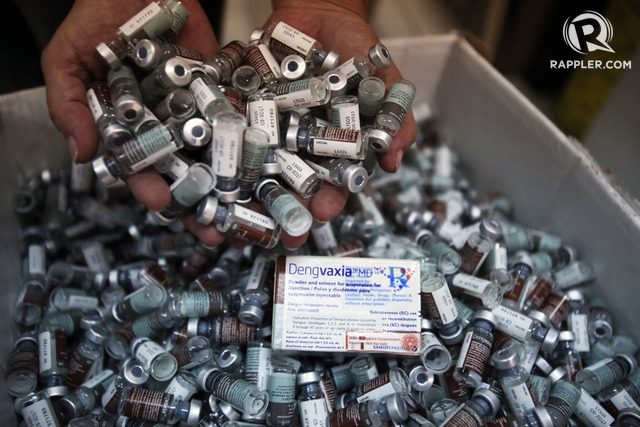SUMMARY
This is AI generated summarization, which may have errors. For context, always refer to the full article.

MANILA, Philippines – The controversial Dengvaxia dengue vaccine will no longer have the prospect of being sold in the Philippines as the Food and Drug Administration (FDA) permanently revoked its certificate of product registration (CPR) on Tuesday, February 19.
The FDA said it revoked the CPR of Dengvaxia after French vaccine company Sanofi Pasteur – which manufactured the vaccine – failed to submit post-approval commitment documents. This, despite being ordered to do so over a year ago.
FDA Director General Nela Charade Puno hit Sanofi for its “complete disregard of FDA rules and regulations.”
“Its brazen defiance of FDA’s directives and its continued failure to comply leaves us no other recourse but to impose the maximum penalty of revocation of the CPRs covering the Dengvaxia products,” Puno said.
With the revocation of its CPR, this means it will now be illegal to import, sell, or distribute Dengvaxia products in the Philippines.
In an order issued on December 21, 2018, the FDA also told Sanofi to immediately surrender the original CPR it received for the Dengvaxia products.
Aside from these, revocation of the CPR also means the FDA’s Center for Drug Regulation and Research (CDDR) will not be allowed to process any submission or application by Sanofi involving the Dengvaxia dengue vaccine.
‘Non-compliance’
The FDA is tasked to determine whether products such as drugs, vaccines, food, and cosmetics are safe and effective for the public to consume. When an FDA issues a CPR, it means the product is allowed to be sold in the country.
Under the FDA’s post-marketing surveillance stage, a company is required to submit several documents to ensure the product is still safe to use even after its release in the market.
In Sanofi’s case, the FDA had issued its certificate of product registration on December 22, 2015. Sanofi, however, failed to submit the necessary post-marketing authorization requirements after being allowed to sell its dengue vaccine.
The CDDR and FDA task force for Dengvaxia said the company failed to submit and comply with its post marketing authorization requirements as of December 17, 2018.
Prior to this, the FDA in January 2018 already noted Sanofi did not comply post-marketing authorization requirements for the vaccine. This caused the company to be slapped with a P100,000-administrative fine for non-compliance.
It was also at this time when the FDA decided to suspended the sale of Dengavixia for a year.
Prior to the revocation of its CPR, the FDA already ordered the market pullout of Dengvaxia on December 4, 2017.
The Dengvaxia controversy started in November 2017 vaccine after Sanofi released an advisory warning that its vaccine could cause a person to later develop severe dengue if he or she had not been infected by the virus prior to immunization.
In the wake of the Dengvaxia scare, immunization rates plummeted and have barely been able to recover since. (Post-Dengvaxia controversy: Paving the way forward for vaccines, health care) – Rappler.com
Add a comment
How does this make you feel?
There are no comments yet. Add your comment to start the conversation.